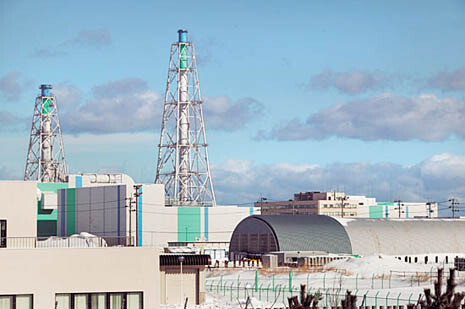hankyoreh
Links to other country sites 다른 나라 사이트 링크
US expresses deep concern over plutonium reprocessing program in Japan

By Gil Yun-hyung, Tokyo correspondent
The US is deeply concerned about Japan’s Rokkasho Reprocessing Plant, which extracts plutonium from spent nuclear fuel, reports say. When the facility, which is scheduled to be completed in October, comes online, the US will run out of reasons to reject South Korean demands to reprocess spent fuel in the same way as Japan. Not only that, but increasing supplies of plutonium that lack a clear purpose run counter to the US government’s principle of blocking nuclear proliferation.
As part of a joint investigation with the Center for Public Integrity (CPI), an American non-profit journalistic organization, the Asahi Shimbun reported on Apr. 13 that Thomas M. Countryman, US Assistant Secretary of State, Bureau of International Security and Nonproliferation, and Daniel Bruce Poneman, US Deputy Secretary of Energy, expressed their serious concern about the factory in Rokkasho to Tatsujiro Suzuki, vice chairman of the Japan Atomic Energy Commission (JAEC), when he visited the US in Apr. 2013.
The facility, which is located in the village of Rokkasho in Aomori Prefecture at the north end of the main Japanese island of Honshu, will be capable of processing 800 tons of spent nuclear fuel into 8 tons of plutonium per year.
According to the report, Countryman said that operations at the Rokkasho plant could become a major concern, mentioning the Iran nuclear program and its ramifications on US-South Korea nuclear cooperation. “If Japan begins operations at the Rokkasho factory before it brings online the fast breeder reactors that can process this plutonium, these two issues could put the US in an awkward position,” Countryman said.
Poneman expressed the US’s concern about Japan having more stocks of plutonium from reprocessing spent nuclear fuel without a plan for consumption.
The reason the plant is drawing global attention is because bringing the factory online would let Japan increase its supply of plutonium, a fuel that can be used to make nuclear weapons. Japan already has 44.2 tons of plutonium, enough to make several thousand nuclear weapons.
Japan claims that it will use the plutonium for peaceful ends in the fast breeder reactors that it is currently developing. However, these development plans have basically run into a dead end, as can be seen in the continuing failure of test operations at the Monju Nuclear Power Plant, a prototype plant. The same is true of the “pluthermal” plan, which involves mixing plutonium and uranium fuel and using it in standard nuclear reactors.
Despite these circumstances, the administration of Shinzo Abe gave final approval through a decision by the cabinet on Apr. 11 to a basic energy plan that includes instructions to move forward with construction of the Rokkasho processing facility. The plan does give a nod to the US with a section about giving ample consideration to the balance between the recovery and use of plutonium. However, given that Japan currently has 17,315 tons of spent nuclear fuel, twenty years of processing the fuel could give it an additional 160 tons of plutonium.
“I was disappointed that Japan and everything they’ve gone through in the last three years hasn’t fundamentally re-evaluated their need for this material,” said Jon Brook Wolfsthal, current Deputy Director of the James Martin Center for Nonproliferation Studies and director of nonproliferation for the National Security Council at the White House from 2009 to 2012. “I think it would be better, personally, if Japan did not have a MOX (mixed oxide fuel) program and operate Rokkasho.”
But there is no chance that Japan would suspend operations at the facility even if the US asked it to, and the US is unable to address the issue outright out of concern that relations between the two countries would deteriorate.
Nevertheless, if Japan’s supply of “suspicious” plutonium continues to grow, this could have a considerable impact on negotiations to extend the US-Japan nuclear treaty, which grants Japan the right to reprocess spent fuel. The treaty is set to expire in July 2018.
Please direct questions or comments to [english@hani.co.kr]

Editorial・opinion
![[Editorial] Does Yoon think the Korean public is wrong? [Editorial] Does Yoon think the Korean public is wrong?](https://flexible.img.hani.co.kr/flexible/normal/500/300/imgdb/original/2024/0417/8517133419684774.jpg) [Editorial] Does Yoon think the Korean public is wrong?
[Editorial] Does Yoon think the Korean public is wrong?![[Editorial] As it bolsters its alliance with US, Japan must be accountable for past [Editorial] As it bolsters its alliance with US, Japan must be accountable for past](https://flexible.img.hani.co.kr/flexible/normal/500/300/imgdb/original/2024/0417/6817133413968321.jpg) [Editorial] As it bolsters its alliance with US, Japan must be accountable for past
[Editorial] As it bolsters its alliance with US, Japan must be accountable for past- [Guest essay] Amending the Constitution is Yoon’s key to leaving office in public’s good graces
- [Editorial] 10 years on, lessons of Sewol tragedy must never be forgotten
- [Column] A death blow to Korea’s prosecutor politics
- [Correspondent’s column] The US and the end of Japanese pacifism
- [Guest essay] How Korea turned its trainee doctors into monsters
- [Guest essay] As someone who helped forge Seoul-Moscow ties, their status today troubles me
- [Editorial] Koreans sent a loud and clear message to Yoon
- [Column] In Korea’s midterm elections, it’s time for accountability
Most viewed articles
- 1[Column] The clock is ticking for Korea’s first lady
- 2Samsung barricades office as unionized workers strike for better conditions
- 3[Editorial] When the choice is kids or career, Korea will never overcome birth rate woes
- 4[News analysis] After elections, prosecutorial reform will likely make legislative agenda
- 5S. Korea, Japan reaffirm commitment to strengthening trilateral ties with US
- 6Why Israel isn’t hitting Iran with immediate retaliation
- 7[Guest essay] How Korea turned its trainee doctors into monsters
- 8Japan officially says compensation of Korean forced laborers isn’t its responsibility
- 9[Editorial] Does Yoon think the Korean public is wrong?
- 10[Editorial] 10 years on, lessons of Sewol tragedy must never be forgotten